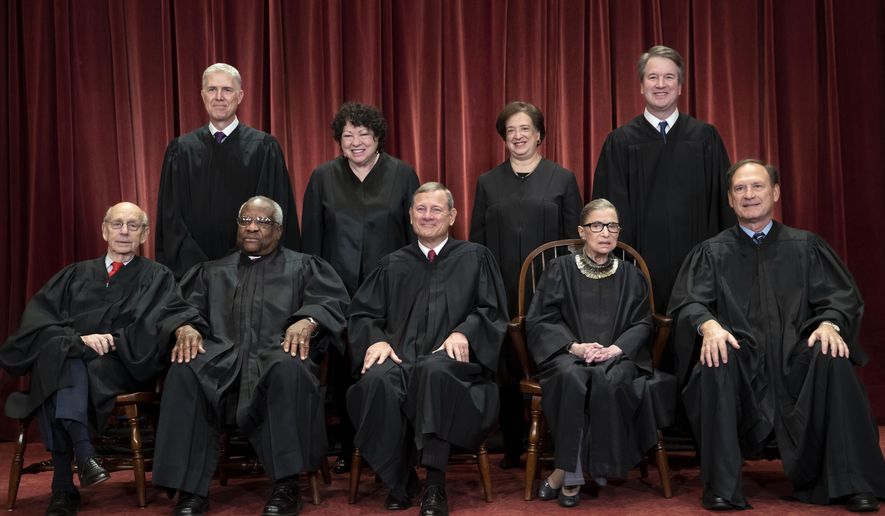The Supreme Court is weighing whether to take a case of a Black Lives Matter activist who doesn’t want to be held liable for an attack on a police officer during a protest in Louisiana.
DeRay McKesson, a top activist in the Black Lives Matter movement, is asking the justices to hear his case after the 5th U.S. Circuit Court of Appeals ruled he was liable for an assault on a police officer at a rally outside a police station in Baton Rouge, Louisiana, in 2016 following the police shooting of Alton Sterling, a black man.
The case has been percolating in the courts for years but has taken on a new urgency with the rise of nationwide protest over George Floyd’s death last month.
The officer in the case, identified only as “John Doe” in court papers, sued Mr. McKesson after being struck in the head by a “rock-like” object when he began arresting unruly protesters. He said the protesters at the rally became aggressive toward law enforcement officers after Black Lives Matter activists whipped the crowd into an anti-police frenzy.
The police officer argued that the First Amendment doesn’t protect the protesters from “negligent, illegal, and dangerous activity that poses a risk of serious harm to others.” Though the individual who threw the object is unidentified, the officer sued Black Lives Matter and Mr. McKesson, hoping to hold someone liable for the assault.
If the justices strike down the 5th Circuit ruling, “John Doe” said the court “would encourage negligent, unpeaceful, and illegal behavior at the expense of others and, in particular, would expose law enforcement officers to serious harm that tort liability is intended to discourage.”
Mr. McKesson contends that if the 5th Circuit’s ruling stays in place and holds organizers liable for other people’s conduct, it will curtail First Amendment rights to peacefully assemble and petition the government for a redress of grievances. He said people will be afraid to protest if they could be held liable for the unlawful acts of others.
“States retain undiminished authority to impose damages on protest participants and leaders who themselves inflict harm. But the Constitution forbids holding a protest leader personally responsible for illegal acts committed by others unless the leader himself incited or ’authorized, directed, or ratified’ the ’specific’ harm-inflicting acts,” Mr. McKesson argued in his petition.
The justices likely will decide in the next few weeks whether to hear the challenge.
The case grew increasingly relevant amid a wave of Black Lives Matter protests across the nation following George Floyd’s death while being arrested by Minneapolis police May 25.
Derek Chauvin, a white police officer had his knee Floyd’s neck for more than eight minutes, has been charged with second-degree murder.
It is unlikely the justices will take up the 2016 case because there are no other circuit court rulings that conflict with the 5th Circuit. Typically, cases that present conflicting rulings amongst federal appeals courts are granted review by the high court.
“I’m not sure it’s a strong candidate. The justices are much more likely to take one or more of the strong qualified immunity petitions,” said Ilya Shapiro, director of constitutional studies at the Cato Institute, referring to a few cases that challenge qualified immunity — a shield from legal liability — that’s afforded to government officials and law enforcement when on the job.
In a related issue, the justices also are deciding whether or not to review challenges to the qualified immunity laws that shield police officers from civil lawsuits for misconduct in the line of duty.
The Black Lives Matter movement is involved in a more recent lawsuit sparked by the Floyd protests.
The American Civil Liberties Union filed a lawsuit against the Trump administration for using force to remove protesters from Lafayette Square outside the White House using force earlier this month.
The ACLU has also filed a class action on behalf of journalists against police officers who acted violently against the media, preventing them from covering the protests that took place in major cities across the nation for more than two weeks.
It’s too early to say if either of those cases will make it to the Supreme Court.
“The justices don’t want to be seen as responding directly to current events anyway,” Mr. Shapiro noted.
• Alex Swoyer can be reached at aswoyer@washingtontimes.com.




Please read our comment policy before commenting.